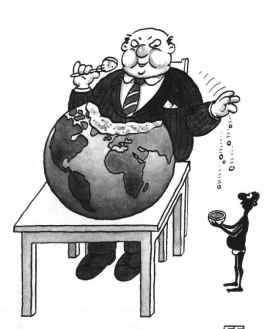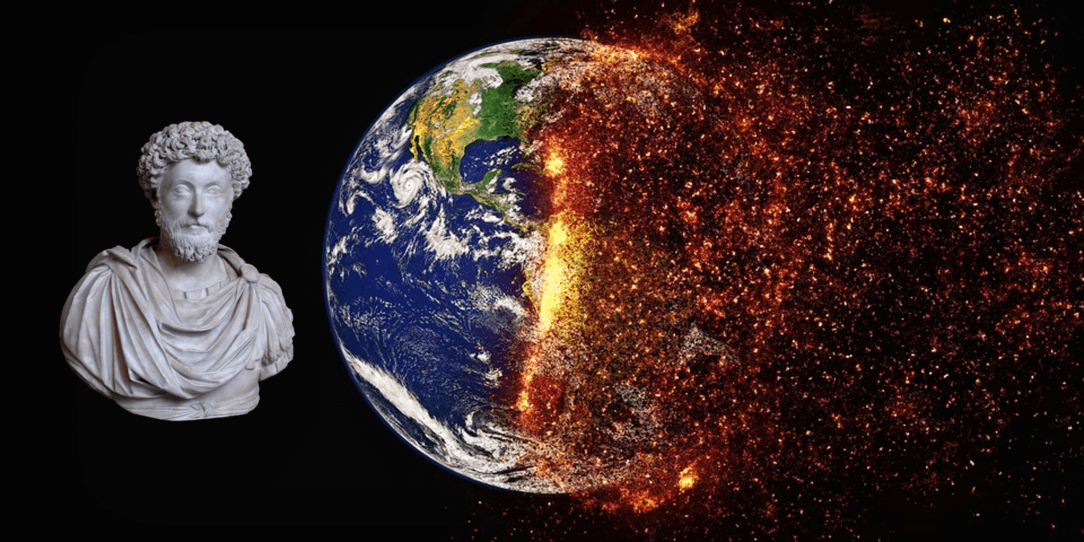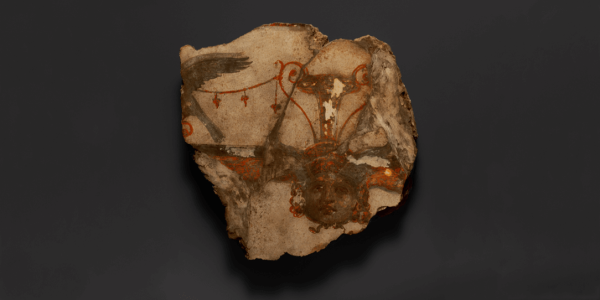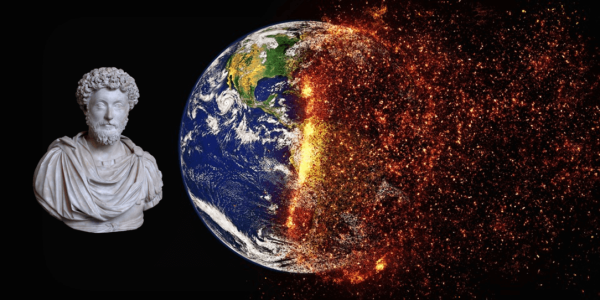This article is a follow up from Leonidas Konstantakos and I’s Stoicon 2018 presentation. It is expected to appear shortly on the Modern Stoicism website.
It may seem that trying to incorporate the modern concept of sustainability into Stoic philosophy is like trying to force the proverbial round peg into a square hole. This hunch is backed-up by the various people who, following our Stoicon presentation in London, said that they were “astonished by the glaring connection between the two”. These kinds of comments satisfy us greatly, because they represent a clear demonstration of the applicability of modern Stoicism to 21st century problems, beyond those of a personal nature. What’s more, they give weight to the idea that the Stoic virtues of courage, justice, self-control and wisdom are fundamental to planetary wellbeing, no philosophical gymnastics required. Crucially, the public’s reaction at Stoicon reaffirmed our belief that sustainable development is intrinsically linked to humanity’s individual and collective progress towards virtuous thoughts and actions.
For those who did not attend in person, allow us to explain…
Sustainable Development and its Opposite
Contrary to popular belief, the terms “sustainability” and “sustainable development” are not synonyms of “environmentally-friendly”. Nor are they limited to a set of actions that one might consider as environmentally-conscious or “green”. Rather, the terms encompass the following definition:
Sustainable development is development that meets the needs of the present, without compromising the ability of future generations to meet their own needs – Brundtland Commission (1987).
It is important to note that “future generations” do not necessary begin life in whatever village or hospital envisioned in 2050. Rather, they represent those babies born right now whilst you are reading this very sentence. These children along with their slightly older, and younger, cohorts represent the future – the next generation – who will inevitably have to tidy-up the mess and mistakes that we are currently making, and which we will take undoubtedly take limited responsibility for. This is why locating the safe space between the three pillars (or spheres) of sustainable development: the environment, society and economy, is paramount to overcoming the most complex challenges of the 21st century.
In our presentation, we used the image associated with this article to didactically show the unmistakable connection between Stoicism and sustainability. Here, you can see that a white business man is eating more than his fair share of the Earth and tossing aside, without a second thought or a second glance, the crumbs that would otherwise fall from his table. Whilst this image depicts and contrasts the stereotypical fat white Western evil banker with the impoverished sub-Saharan African make no mistake – this is not a rich Global North vs poor Global South problem. Rather it is one of greed (as the opposite of self-control), cowardice, injustice and ignorance. In short, the cartoon portrays a world which propagates the Stoic vices.

Such a world is an unsustainable miserable existence for the many, who in supporting (or in turning a blind eye to) the few “more equal than others”, have not sought justice. Neither have they had the courage to punish greed. Further, the wisdom of knowing what to do, why to do it and how to do it has not been obtained. Thus, greed, injustice, cowardice and ignorance are the polar opposites of sustainable development.
An Anti-Stoic Approach
In order for humanity, non-human beings and the Earth to occupy the safe space defined by the term “sustainability” we must cherish the idea of a world where progress towards virtue is both encouraged and rewarded. More importantly we must take steps to ensure that it is so. Yet, in a political climate where the likes of Donald Trump and Jair Bolsonaro are deemed charismatic leaders for their most un-Stoic of sentiments and approaches, appealing to common sense, and much less virtue, seems out of step. For some, it may even appear to be hopelessly naïve or futile. But who ever said being Stoic was easy? It certainly wasn’t Seneca.
Each individual’s Stoic journey is a tough one and progress towards eudaimonia (happiness, wellbeing) is a lifelong affair. It is as much about persistence and grit, as it is about having enough vision and desire to acknowledge the value in (sometimes) forsaking momentary pleasure for virtue. And, given just how hard it is for one person to make progress, we are under no illusion as to the near impossibility it is for enough people to coincide in ideas and values to make the difference. But make the difference we must, because Trump and his tweets aren’t going to save us. For how can nationalism ever hope to combat the global threat of sea level rise caused by climate change? How can a stream of social media updates help us put a stop to dubious computer algorithms, excessive material consumption, fake news and political apathy?
These are the challenges that we are facing today. They are borderless. They are real. They are complex. And, politicians peddling sexist, racist or nationalistic nonsense are not only out of touch with reality but dangerously ill-equipped to lead us into the 21st century – to the detriment of us all.
The Stoic Solution
So why do we think Stoicism can provide (some of) the answers? Because, as New Zealand’s prime minister Jacinda Arydern said, in her address to the United Nations, #MeToo must become #WeToo. And, by definition Stoicism, with its cosmopolitan ideal, is the embodiment of #WeToo. The latter will take vision and proactive steps, but we do believe that the Stoic community can provide solutions for everyday life according to Nature and to the facts. However, before we can do this, we must recognise that Stoicism is more than a personal philosophy. After all, the personal is political. The ancient Stoics knew this and lived it.
We modern Stoics must return to our roots instead of hiding behind a superficial understanding of “it is beyond my control” or “one should learn to deal with insults”. We have an obligation to participate in initiatives that break down social barriers. We should stand beside women and non-white men trapped by a glass ceiling at work and elsewhere. We must make every effort to see things from their perspective, rather than deny the ceiling’s very existence when we are, in fact, standing on it. This is especially the case if we happen to be a straight white middle-class male with all the privileges that entails, through no fault of our own. In Stoicism, the acknowledgement of fortune’s favour coupled with the need to use it for the betterment of humankind is nothing new. Indeed, Marcus Aurelius, Cato the Younger, Seneca and Musonius Rufus, as members of the ancient elite, all recognised that a position (role), comes with duties, whether they liked it or not.
If we are academics, we must return the philosophy to the Stoa, the marketplace for the exchange of ideas and not an ivory tower built on paywalls. Incidentally, this is why, where possible, Leonidas and I place our Stoic articles in open access. We use precious faculty resources or pay out of our own pockets so you, the reader, do not have to.
Finally, we must all encourage the development of good ideas and back them, regardless of who is stating them. Together, regardless of academic discipline or non-academic walk of life, we must all explore what Stoicism has to offer on a societal/global level, as sustainability is, by definition, about justice, self-control and wisdom, along with having the courage to take difficult decisions.
Stoicism Cannot Go it Alone
Whilst it may have sounded a bit like heresy at the Stoicon conference, we stand by our assertion that Stoic philosophy cannot answer all the questions that might be asked in the 21st century. It cannot even derive all the questions that need to be asked. In fact, in our presentation, we joked that in the word “philosophy” there was no such thing as “T.E.A.M” but that there was definitely an “I”. We said this because it reflects the perverse disincentives that exist in the academic field of philosophy, which serve to discredit teamwork to the point that partnering up can be a major obstacle for those young researchers trying to obtain the job security and prestige that comes from having track tenure. This has to change. It is absurd to think that one brain can outsmart or out-think the multidisciplinary team required to tackle climate change, the threat of nuclear warfare or the technological disruption that comes with automation, artificial intelligence and mass unemployment. We are in right in thinking that we do need ethics but we also need to get a handle on the facts. That means that philosophers, engineers and international policy analysts, for example, must each recognise that they are only one piece of a puzzle and that they will need to come together to solve it.
So what does all this mean?
One of the great thinkers of our times, Yuval Noah Harari says in his new book 21 Lessons for the 21st Century:
“If we want to survive and flourish, humankind has little choice but to complement local loyalties with substantial obligations towards a global community. A person can and should be loyal simultaneously to her family, her neighbourhood, her profession and her nation – why not add humankind and planet Earth to that list?”
Having proposed adding the “Earth” to the circles of concerns in the academic paper that paved the way for the Stoicon presentation, previous to the publication of Harari’s third book, we are pleased that others are also independently reaching the same conclusions.
In a practical sense, we put forward the idea that if we Stoics agree that Earth should be included in the circles of concern then we cannot philosophically justify intensive farming because of its effect on soil and water quality, biodiversity and carbon emissions. Likewise, we must take steps to curtail the buying and throwing away of single use plastic cups and cheap fashion – there is no “away”. Furthermore, and perhaps more critically, for those of us who wish to live according to Stoic principles, we cannot continue to support farming practices or diet choices that prevent a livestock’s capacity to live according to their Nature, because they are caged, stapled to the floor, tied-up or separated from their mother – which effectively rules out most of our meat and dairy suppliers.
In the presentation, as we will end here, we left the audience with a simple answer to a question that typically gets bounded about in the various Stoic Facebook groups:
Is it Stoic to… be unsustainable?
No, dear Stoics, it is not!



